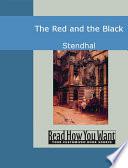Il n’y a point de droit naturel: ce mot n'est qu’une antique niaiserie... Avant la loi il n’y a de naturel que la force du lion, ou le besoin de l’être qui a faim, qui a froid, le besoin en un mot.
Vol. II, ch. XLIV
Variant translation: There is no such thing as natural law, the expression is nothing more than a silly anachronism … There is no such thing as right, except when there is a law to forbid a certain thing under pain of punishment. Before law existed, the only natural thing was the strength of the lion, or the need of a creature who was cold or hungry, to put it in one word, need.
As translated by Horace B. Samuel (1916)
Le Rouge et le Noir (The Red and the Black) (1830)

